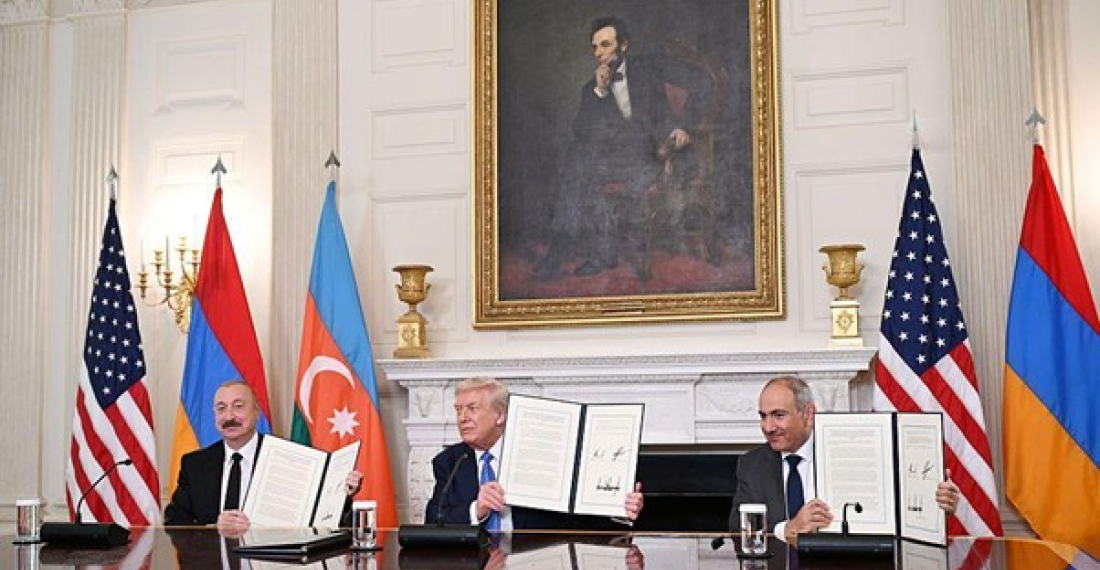The meeting of president Ilham Aliyev of Azerbaijan, and prime minister Nikol Pashinyan of Armenia in the White House on 8 August 2025 has been described many times as being “historic”, and in many ways it was. However the presence and active participation of the president of the United States made it “special”.
However, Donald Trump managed to make the event “larger than life”. Trump was on his best behaviour. He was relaxed and happy. He piled profuse compliments on his two guests, and they replied in kind, indulging in flattery that at times was embarrassing. But you can excuse them. Never have two foreign leaders been so warmly welcomed in the White House.
The substance was thin: the peace agreement between Armenia and Azerbaijan was initialed but not signed; much of what was included in the Joint Declaration was aspirational, requiring further negotiations. But the symbolism and imagery was powerful. And in this case, it mattered.
The world has scrambled to welcome the Armenia-Azerbaijan meeting in Washington. The European Union was first: Commission president Ursula von der Leyen and Council president, Antonio Costa, issued a statement within minutes. Various other EU personalities followed on Saturday. There was an important statement by Turkey, followed by UK, Netherlands, Georgia, Saudi Arabia, Poland, UAE, France, Israel, the Central Asian countries and others. Statements were also issued by the UN, NATO, OSCE, Council of Europe, NATO PA and others.
The reaction from Russia came late on Saturday and was muffled. It was left to Russian Foreign Ministry spokesperson Maria Zakharova to say
"It should be remembered that the current stage of normalization of Armenian-Azerbaijani relations began with the direct support and central role of Russia, with the adoption of a trilateral statement at the highest level on November 9, 2020, on a ceasefire and all military operations in the Nagorno-Karabakh conflict zone. A Russian peacekeeping contingent has been deployed in the region, which has made an irreplaceable contribution to stabilizing the situation. We will always remember our peacekeepers who died in the performance of their duties," the diplomat emphasized.
Reconciliation between Azerbaijan and Armenia should be integrated into the regional context and based on a balance of interests, said Zakharova. She noted that the meeting of the leaders of Armenia and Azerbaijan held in Washington with the mediation of the United States deserves a positive assessment. The involvement of regional players in the search for solutions in the South Caucasus should not create new dividing lines, Zakharova emphasized.
The Russian Federation will further analyze Washington's statements on the unblocking of regional communications in the South Caucasus. Trilateral agreements with the participation of the Russian Federation in the field of unblocking of communications in the South Caucasus remain relevant, Zakharova noted.
The emperor is naked. Russia is loosing the South Caucasus and Zakharova is clutching to straws in an attempt to hide facts.
Domestic reaction is subdued
Reaction in Azerbaijan, and particularly in Armenia, has been subdued.
The president of the influential APRI Centre in Yerevan, Lara Setrakian, said, “Once the peace agreement is implemented it will turn Armenia firmly toward the West. It will also likely mean a reorientation of regional power dynamics, giving the United States strategic influence in Russia’s neighborhood and a foothold on the doorstep of Iran. The US wins big, with technology, critical minerals, and energy deals ahead. ”
But in the end the world reaction matters. And for the moment Aliyev and Pashinyan bask in it.
Source: commonspace.eu







